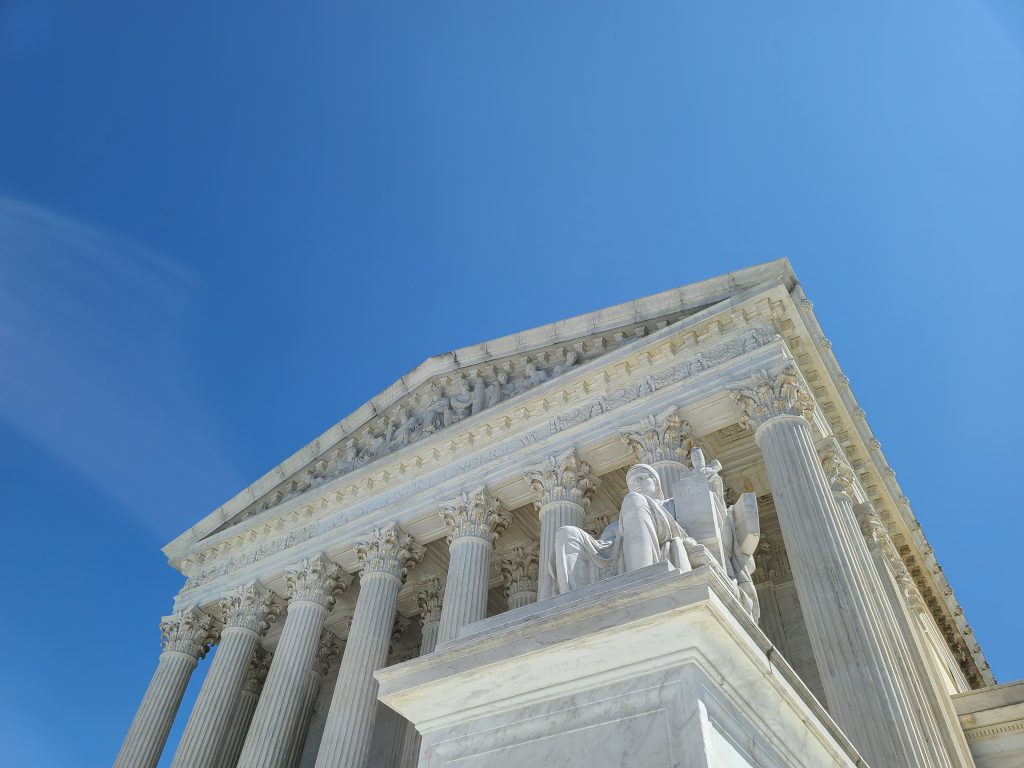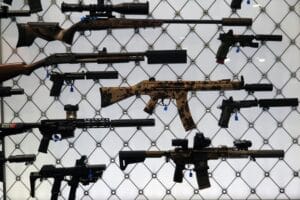We have numbers to put up against the clear feeling that Bruen has resulted in the beginnings of a sea change in how federal courts approach gun cases.
31 Second Amendment claims have seen success in federal court since Bruen was decided, according to a new report. There were zero in the immediate aftermath of Heller. That’s certainly a stark difference but it’s also one that makes sense when you look at Bruen’s message for lower courts.
I’m experiencing one effect of the Bruen ruling myself this weekend as I finish up a training course that will qualify me for DC and Maryland’s concealed carry permits. Those will give me a fairly large collection alongside the Virginia permit I already have and the Pennsylvania permit I’m waiting on. I’ve already done the classroom portion (which was a bit of a refresher since I’m certified to teach the basic pistol course I was taking) and most of my range portion is tomorrow.
After that, I’ll still have to go through the months-long fingerprinting and application process before I can actually carry in DC or Maryland. Both states have far more restrictions on where carry is legal even with a permit too (DC’s rules are particularly convoluted). But I still think it’ll be a worthwhile collection of permits to have in the end. Better to have the legal protection and not need it than the other way around.
Anyway, back to the news. Contributing Writer Jake Fogleman takes a close listen to the silence from gun-control advocates in the wake of the ruling against California’s “Unsafe Handgun Law.” Often not speaking can be louder than yelling. That may be the case here. In fact, I might go one step further than Jake and say it might signal an appeal isn’t coming in that case as crazy as that sounds given the state’s track record.
Plus, YouTuber Reno May joins the podcast to talk about why he joined the suit against California’s handgun restrictions and how they won.

Analysis: Why Bruen Has Led to More Gun Laws Being Struck Down Than Heller [Member Exclusive]
By Stephen Gutowski
The Supreme Court’s decision in New York State Rifle and Pistol Association v. Bruen has already had wide-reaching consequences. And that shouldn’t come as a surprise.
On Wednesday, a revised paper published by Jake Charles, an associate professor at Pepperdine University, chronicled 31 Second Amendment claims that have been successful since Bruen was decided in June. That’s 31 more than the number of successful claims in the year after District of Columbia v. Heller. In fact, it took four years for the pro-gun litigants to achieve the same level of success after Heller.
But that’s to be expected because Bruen is, by and large, an explicit refutation of how lower courts had handled gun cases in the 14 years after Heller. The Court completely rejected the two-step analysis that had become the standard for judging gun laws in the more liberal circuits, which also happened to be where the most controversial laws exist. It held the first step of deciding if a law implicates the Second Amendment was acceptable, but not the second step of balancing the right against the asserted government interest in restricting it.
“Despite the popularity of this two-step approach, it is one step too many,” the Court ruled. “[Heller] and McDonald do not support applying means-end scrutiny in the Second Amendment context. Instead, the government must affirmatively prove that its firearms regulation is part of the historical tradition that delimits the outer bounds of the right to keep and bear arms.”
The majority then spent four pages going over how Heller should be properly understood. It is a detailed explanation of why the Court feels its ruling has not been given the deference it should have received.
“As the foregoing shows, Heller’s methodology centered on constitutional text and history,” the Court wrote. “Whether it came to defining the character of the right (individual or militia dependent), suggesting the outer limits of the right, or assessing the constitutionality of a particular regulation, Heller relied on text and history. It did not invoke any means-end test such as strict or intermediate scrutiny. Moreover, Heller and McDonald expressly rejected the application of any ‘judge-empowering ‘interest-balancing inquiry’ that ‘asks whether the statute burdens a protected interest in a way or to an extent that is out of proportion to the statute’s salutary effects upon other important governmental interests.'”
Justice Clarence Thomas, who penned the Bruen opinion, goes one step further by returning his oft-repeated critique of how lower courts treated the Second Amendment after Heller.
“The constitutional right to bear arms in public for self-defense is not ‘a second-class right, subject to an entirely different body of rules than the other Bill of Rights guarantees,'” the majority wrote. “We know of no other constitutional right that an individual may exercise only after demonstrating to government officers some special need. That is not how the First Amendment works when it comes to unpopular speech or the free exercise of religion. It is not how the Sixth Amendment works when it comes to a defendant’s right to confront the witnesses against him. And it is not how the Second Amendment works when it comes to public carry for self-defense.”
So, it would be more surprising if the lower courts responded to Bruen in the same muted way they did Heller and Mcdonald. That they’ve abandoned the two-step analysis that upheld nearly all gun laws and applying a text and tradition standard that’s far more perilous for modern restrictions is what anyone who read Bruen should have seen coming (regardless of how you feel about that outcome).
Of course, it wasn’t just the rebuke and explanation of Heller that made it happen. It also came down to the explicit adoption of that text and tradition standard. Heller and Mcdonald may well have hinted at a similar test, but Bruen actually spelled it out. That surely had a strong effect as well, especially on the district courts that have delivered most of the wins thus far.
It’s easier to default to an explicit test laid out by the Court than try to piece one together from rulings that don’t spell things out on how future cases should be decided. That taken together with the dressing down by the Court, explain pretty well why 14.6 percent of post-Bruen claims have succeeded while fewer than ten percent did after Heller, according to Charles.
Perhaps more interesting than the number of cases decided in favor of pro-gun plaintiffs is which claims have had success. And which haven’t. At least, not yet.
Challenges over carry licensing and defaulting private property to off limits for gun carry have a 100 percent success rate thus far. Cases against age restrictions, homemade gun bans, and gun-free zones have won about half the time. But claims against the National Firearms Act, commercial regulations, unlawful gun use, sentence enhancements, and bail conditions have been duds.
Some of that is to be expected too, since Bruen directly dealt with gun-carry licensing and sensitive places restrictions. But it’s interesting to see how little progress there has been on things like non-violent felon gun prohibitions. Those were gaining steam before Bruen but haven’t had any success thus far in its wake.
Perhaps, that will change as Bruen’s effect picks up steam. Or, perhaps, the momentum of pro-gun litigators will stall as it crashes up against the formidable stony shores of the Ninth or Second Circuit Court of Appeals. Those were the laboratories of law in which the now-defunct two-step test was created after all.
The Supreme Court’s prolonged inaction after that trend began is what let it take hold. The only thing that could stop it from happening again should those circuits decide to take that route is the Supreme Court stepping in far sooner than last time. As much as gun-rights advocates have gotten off to a fast start in the post-Bruen era, the fight over the Second Amendment is a marathon–not a sprint.
Podcast: YouTuber Reno May on His Win Over California’s Handgun Roster [Member Early Access]
By Stephen Gutowski
This week, California gun owners received positive news when a federal judge ruled the state’s handgun restrictions are unconstitutional.
So, we decided to reach out to one of the most prominent plaintiffs in the case: YouTuber Reno May. He said he is happy with the outcome of the case. He even expressed optimism that the ruling might go into effect without an appeal.
Federal District Judge Judge Cormac J. Carney agreed with May and the other plaintiffs’ argument that the state’s “Unsafe Handgun Law” violates the Second Amendment. He found the requirement that all new models of handguns include loaded chamber indicators, magazine disconnect safeties, and microstamping were unlike anything in the historical record. Judge Carney said that the law can’t stand under the Bruen standard.
While the problem with California banning handguns that don’t feature a theoretical technology, like Microstamping, May explained why the other two requirements were actually more challenging for gun makers to meet than they first seem. For instance, many modern guns have some kind of loaded chamber indicator, but California requires one that has a specific phrase written on it to qualify.
May said the law has prevented him from buying any modern handgun from a dealer since he started buying them after 2013. He noted he and other Californians may still have to wait to buy new handguns, though, because the ruling doesn’t go into effect for several more days. And he noted California is likely to appeal the verdict while asking for a stay that would delay the effect of this ruling.
But he noted the odd silence from the state and gun-control supporters about the case. That gives him hope that an appeal may not be coming. May also gave us some insight into the modern pistols he plans to buy if no appeal comes.
Plus, Contributing Writer Jake Fogleman and I talk about why a federal judge added Polymer80 to the list of companies the ATF can’t go after under President Biden’s “ghost gun” ban.
You can listen to the full episode on your favorite podcasting app or by clicking here. Video of the show is available on our YouTube channel. Reload Members get access on Sunday. Everyone else gets access when the show goes public on Monday.
Come on the Podcast
One of the many perks of a Reload membership is the opportunity to appear on the podcast. We’ve had a lot of people on the show from all kinds of backgrounds. It’s one of my favorite segments since it gives us all a better insight into the community that makes this publication possible. If you want to come on the show, just reply to this email and let me know!

Analysis: Gun-Control Advocates Mum After Judge Blocks California Handgun Restrictions [Member Exclusive]
By Jake Fogleman
A federal judge struck down a California gun control law this week. The reaction, or lack thereof, among gun control advocates was noticeable.
On Monday, Judge Cormac J. Carney, a George W. Bush appointee, issued a preliminary injunction against significant provisions of California’s “Unsafe Handgun Act.” He ruled that the law’s loaded chamber indicator, magazine disconnect safety, and microstamping requirements—which together functionally outlawed the sale of new handguns starting in 2013—lacked compelling historical analogues and were thus unconstitutional.
“Californians have the constitutional right to acquire and use state-of-the-art handguns to protect themselves,” Judge Carney wrote in his opinion. “They should not be forced to settle for decade-old models of handguns to ensure that they remain safe inside or outside the home.”
Gun-rights activists, particularly those in California, were ecstatic following the decision.
“For decades, this ‘roster’ law has deprived law-abiding citizens of the right to choose a handgun appropriate for their individual needs,” Chuck Michel, California Rifle and Pistol Association president, told The Reload. “If we can hold on to this great Second Amendment win, people will be able to choose from among thousands of the latest, greatest, and safest handguns made today.”
But with that ecstasy among gun-rights supporters, one would expect a Newtonian equal and opposite reaction from those on the gun control side of the advocacy world. Instead, there have only been crickets.
None of the three major U.S. gun control organizations—Everytown, Giffords, and Brady—have thus far issued a public statement on the ruling. Neither have each of the groups’ respective leaders in an individual capacity. That’s a significant departure from the groups’ usual course of action following major gun rulings.
Even California Governor Gavin Newsom (D.), never one to shy away from issuing a public tongue-lashing to judges who strike down gun laws, including when they happen in other parts of the country, has been silent.
Only California Attorney General Rob Bonta (D.), whose office was tasked with defending the law in court, released a public statement in response to the injunction. And even his response was relatively tepid.
“The fact of the matter is, California’s gun safety laws save lives, and California’s Unsafe Handgun Act is no exception,” he said. “We will continue to lead efforts to advance and defend California’s gun safety laws. As we move forward to determine next steps in this case, Californians should know that this injunction has not gone into effect and that California’s important gun safety requirements related to the Unsafe Handgun Act remain in effect.”
That last bit of Bonta’s statement could explain why gun-control advocates have chosen not to voice their outrage at this latest ruling. Because Judge Carney stayed his ruling for two weeks to allow the state a chance to appeal, perhaps some of the shock of the outcome was forestalled.
But that seems unlikely, given that it has never been enough to avoid public condemnation in other gun rulings in the past. Consider Federal Judge Roger Benitez’s 2021 ruling striking down California’s “assault weapon ban.” Benitez stayed that decision for 30 days to allow time for a state appeal. Nevertheless, both Bonta and Newsom were forceful in their condemnation.
“Today’s decision is fundamentally flawed,” Bonta said in a news release at the time. “There is no sound basis in law, fact, or common sense for equating assault rifles with Swiss Army knives — especially on Gun Violence Awareness Day and after the recent shootings in our own California communities.”
“Overturning CA’s assault weapon ban and comparing an AR-15 to a SWISS ARMY KNIFE is a disgusting slap in the face to those who have lost loved ones to gun violence,” Newsom tweeted. “This is a direct threat to public safety and innocent Californians. We won’t stand for it.”
Newsom went even further in that instance, calling into question Judge Benitez’s character by suggesting he is a “wholly-owned subsidiary of the gun lobby and the National Rifle Association.”
Yet, in this instance, with another Bush-appointed judge having blocked California’s gun laws, the same rhetoric has not materialized. That may signal the law’s supporters recognize the Unsafe Handgun Act is particularly vulnerable in court and the court of public opinion. It has been uniquely burdensome on gun owners, even by California’s standards. And that was before the Supreme Court added a new level of scrutiny to gun-control laws in its Bruen decision.
Since 2013, there have been zero new handguns approved to the roster due to the inability of gunmakers to comply with an as-of-yet infeasible technology like microstamping. Meanwhile, handguns have continued to be removed from the roster for various reasons, resulting in an ever-diminishing supply of legal handguns for civilians to purchase. The Bruen test aside, a slow-moving march toward banning legal handgun sales was eventually bound for trouble in court.
The state may realize that the law was not advancing any public safety goals, given that it contained numerous exceptions for government officials to purchase and use “unsafe” handguns as they saw fit. As Judge Carney’s ruling pointed out, even California’s own witness in the lawsuit testified that he “uses an Off-Roster duty handgun” without any of the enjoined safety features in his job as a law enforcement officer, as do most other departments in the state.
It’s entirely possible that the law was so uniquely unreasonable that even gun-control advocates felt they shouldn’t make too much noise about seeing it struck down. That’s not to say that they agree with the outcome. Indeed, California may well appeal the decision in the coming days (though Bonta was notably non-committal in his statement). But gun-control advocates’ silence over the injunction speaks volumes about the politics of the case.
That’s it for now.
I’ll talk to you all again soon.
Thanks,
Stephen Gutowski
Founder
The Reload







